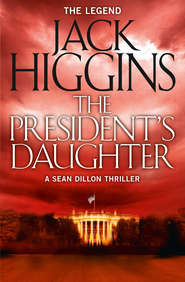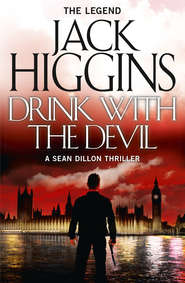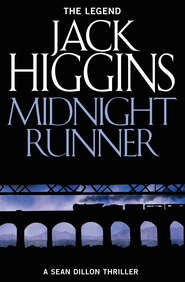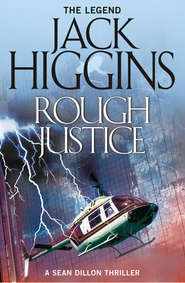По всем вопросам обращайтесь на: info@litportal.ru
(©) 2003-2024.
✖
Wrath of God
Автор
Год написания книги
2018
Настройки чтения
Размер шрифта
Высота строк
Поля
‘I am,’ I told him shortly, and pulled on my jacket. ‘Anything else?’
He opened a drawer, took out two envelopes and pushed them across. ‘One of those is a letter to Gomez, the man to whom you’ll deliver the goods in Huila. He has a supply of petrol by the way, so you’ll be all right for the return trip. The other contains an authorization to make the journey signed by Captain Ortiz, in case you are stopped by rurales.’
I put them both in my breast pocket and buttoned my jacket. He selected a long black cigar from a sandalwood box, lit it, then pushed the box across to me. ‘You’ll have a drink with me, sir, for the road?’
‘We have a saying where I come from,’ I told him. ‘Drink with the devil and smile.’
He laughed till the tears squeezed from his eyes, the flesh trembling on the gross body. ‘By God, sir, but you’re a man after my own heart, I can see that.’
He shuffled across to a side cabinet, opened it and produced a bottle and a couple of tumblers. It was brandy, and good brandy at that.
He leaned one elbow on the cabinet and eyed me gravely. ‘If I might be permitted the observation, sir, you don’t seem to care very much about anything. About anything at all. Am I right?’
That strange, rather pedantic English of his had a curious effect. It made one want to respond in kind. I said, ‘Why, it has been my experience that there is little in life worth caring about, sir.’
I could have sworn that for a moment there was genuine concern in his eyes although I considered it unlikely he could ever have afforded such an emotion.
‘If I may say so,’ he observed heavily, ‘I find such sentiments disturbing in one so young.’
But now the conversation had gone too far and we were into entirely the wrong territory. I emptied my glass and placed it carefully on top of the cabinet. ‘I’d better be on my way.’
‘Of course, but you’ll need a little eating money.’ He produced a wallet and counted out a hundred pesos in ten-peso notes. ‘You should be back here by tomorrow evening if everything goes smoothly.’
By now he was looking quite pleased with himself again which simply wouldn’t do. I stuffed the money carelessly into my jacket pocket and said, ‘Life has taught me one thing above all others, Mr Janos, which is that anything can happen and usually does.’
His face sagged in genuine and immediate dismay for, as I discovered later, there was a strongly superstitious streak in him, his one great weakness. I laughed out loud, turned and walked out. A small victory, perhaps, but something.
I was eighteen years of age when I first saw men die. Easter, 1916, and a sizeable section of Dublin town going up in flames as a handful of volunteers decided to have a crack at the British Army.
And I was one of them, Emmet Keogh, hot from my books at the College of Surgeons, still young enough to believe a cause – any cause – could be worth the dying. A Martini carbine gripped tightly in my hands, I sweated in ill-fitting green uniform and crouched at the window of an office in Jacobs’ Biscuit Factory, a romantic place to die in, waiting for the Tommies from the Portobello Barracks to find us which they did soon enough.
During a slight lull in the proceedings a Mills bomb came through the window and rolled to a halt in the very centre of that busy office.
There were six of us who should have died, but for some reason it didn’t go off until I’d thrown it back out of the window at the troops who had chosen that precise moment to make a rush across the yard.
Life, then, or death, was an accident one way or the other. Time and chance and no more than that. Let it be so. Certainly from that day on it conditioned not only my actions but also my thinking. Janos had been closer to the truth about me than he knew.
For the first few miles out of Bonito the road wasn’t too bad, in fact had obviously been metalled at some time in the past, but not for long. Soon it changed into a typical back-country dirt road with a surface so appalling that it was impossible to drive at more than twenty-five miles an hour in any kind of safety.
In the distance, the Sierras undulated in the intense heat of late afternoon and I drove towards them but slightly to the north-west, a great cloud of white dust rising from the loose surface coated everything including me.
A flat brown plain stretched on either hand as far as the eye could see, dotted with thorn bushes and mesquite and acacias. I was alone on a road that led to nowhere through a land squeezed dry by the sun, barren since the beginning of time.
God, but there were times when I ached for my. own country, for the sea and the mountains of Kerry, green grass, soft rain and the fuchsia growing on dusty hedges. The Tears of God we called it.
I passed nothing that lived for the first hour, then a dot in the far distance grew into a herd of goats, an old man and two young boys in charge, barefooted, ragged, so wretchedly poor that even their straw sombreros were falling to pieces. They stood watching me, faces blank, making no sign at all, the sullen despair of those truly without hope.
I stopped a mile or two farther on to get rid of my jacket, being well soaked with sweat by then and drank and sluiced my head and shoulders with lukewarm water from a four-gallon stone jug someone had thoughtfully roped into place in front of the passenger seat.
From there on things became so bad that I had to drive very cautiously indeed, sometimes at not more than ten or fifteen miles an hour and the heat and the dust were unbelievable. I had been on the road for three and a half hours, had seen no one except the goatherds, was beginning to believe I was the only living thing in this sterile world, when I found the priest.
The Mercedes was a little way off the road and had ploughed its way through a clump of organ cactus. The priest stood at the side of the road, his cassock and broad-brimmed hat coated with dust, and waved me down. I braked to a halt and got out.
He recognized me at once and smiled, ‘Ah, my Irish friend.’
His front near-side tyre had burst which explained his sudden departure from the road, but he had come to rest with his rear axle jammed across a sizeable rock and had spent a futile hour trying to push the car free.
The solution was ludicrously simple. I said, ‘If we raise her off the rock with the jack and give her a good push she should roll clear soon enough.’
‘Why damn my eyes,’ he said. ‘Why didn’t I think of that?’
He would have gone down well on the Dublin Docks, but I didn’t say so. Simply opened his boot which was full of five-gallon cans of petrol, got out the jack and started to work.
‘No reason why I shouldn’t do that, it seems to me,’ but he didn’t try too hard to dissuade me, lit one of those long, black cigarillos he favoured and stood watching. I was sweating hard and the shoulder holster was something of a nuisance so I unstrapped it and put it on the rear seat of the Mercedes. Chancing to glance up a moment later, I saw that he was holding the Enfield in his right hand.
‘Careful, father,’ I warned. ‘What’s known in the trade as a hair trigger. She’ll go off at a breath.’
‘Wouldn’t it be better to have the pin fall on an empty chamber for the first pull,’ he suggested. ‘In case of accidents?’
Which was reasonably knowledgeable for a man of the cloth. ‘Fine, if you have the time to waste.’
‘Presumably you don’t.’
‘Not very often.’
He stood there, still holding the Enfield in one hand, the holster in the other. ‘You were out in the Troubles,’ he said. ‘Against the English, I mean?’
It was the kind of language American newspapers had been fond of at the time. I nodded. ‘You could say that.’
‘This Civil War back there is a bad business.’ He shook his head. ‘From what I read in the papers the Irish are killing each other off more savagely these days than the English ever did. Why, didn’t Republican gunmen kill Michael Collins himself only three or four months ago and I always understood he did more to beat the English than any man.’
‘Then settled for half a loaf,’ I said. ‘Not good enough.’
‘A die-hard republican, I see.’ He hefted the Enfield in his hand and said, ‘Not that I know about such things, but it doesn’t feel very comfortable.’
‘It wouldn’t,’ I told him. ‘I’m left-handed. The grip has been altered to fit.’
He examined the gun further, obviously intrigued by the absence of a sight at the end of the blue-black barrel, the way most of the trigger guard had been cut away. I concentrated on the jack lever and as the axle started to clear, he dropped the shoulder holster inside the Mercedes, hitched up his cassock and got to his knees beside me.
‘What do you think?’
‘Put your shoulder to the boot and we’ll find out.’
It took the two of us, and some considerable effort. There was a moment when I thought it wasn’t going to go and then the jack tilted forward and the Mercedes rolled free, scraping the rear bumper on the rock in the process. He lost his balance and fell on his hands and knees and I ran around and got the handbrake on before the Mercedes got clear away from us. When I turned, he was getting to his feet, rubbing dust from his beard and grinning like a schoolboy.
‘A hell of a way to spend an afternoon.’
‘I could think of pleasanter things to do,’ I admitted. ‘In more comfortable places.’ I stretched my aching back and looked out across the wilderness. ‘The last place God made.’











